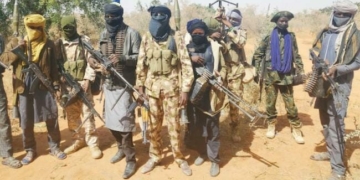- The main objective of the project is to advance democracy and national cohesion, peaceful coexistence, and the well-being of civilians
- The Japanese government’s commitment to supporting Nigeria’s efforts to create a safe and secure environment for all
Matsunaga Kazuyoshi, the Japanese Ambassador to Nigeria, described how he witnessed firsthand the plight of those affected by the Boko Haram insurgency in Internally Displaced Persons (IDP) camps during a visit to Maiduguri, Borno state’s capital.
He lamented Nigeria’s long history of insurgency and terrorist attacks, particularly from Boko Haram in the North East.
Speaking at the Martin Luther Agwai International Leadership and Peacekeeping Centre (MLAILPKC) in Jaji, Kaduna, during the launch of projects for 2024, he stated that these acts of violence have devastated lives and communities, resulting in the loss of lives and property, mass displacement, and significant economic losses.
He then reiterated the Japanese government’s commitment to supporting Nigeria’s efforts to create a safe and secure environment for all.
“This project being executed through the United Nations Development Programme (UNDP) exemplifies that commitment, and we believe it will significantly contribute to achieving that goal.”
“One crucial aspect of building a lasting peace is ensuring the active participation of women. Women are not just victims of conflicts but perfect agents for peace.
“This is precisely the core principle of the Women Peace and Security PPS Agenda which is the top priority for foreign minister Kami Kaowa, she even had the opportunity to meet some of the top IDP women leaders primarily from the North East during her visit and that is and directly listening to their stories.
“During my visit to Maiduguri on 10th March, I witnessed first-hand the plight of those impacted in the IDP camp. Just recently, the Japanese Foreign Minister, Mrs. Kam Kaowa, concluded her first visit to Nigeria, emphasising the critical importance of peace and security for Nigeria’s continued development and prosperity.”
Since its inception, the centre has trained over 100,000 troops in pre-deployment training and over 2,200 people in individual peace support operation courses drawn from Nigeria’s armed forces, paramilitary organisations, government ministries, departments, agencies, civilians, and allied countries.
Major General Sani Muhammad, Chief of Training Army Headquarters, was represented by Major General Oluyemi Olatoye, Commandant of the Nigerian Army School of Infantry, and stated that the 2024 Project will cover three critical courses: Leadership and National Cohesion, Comprehensive Protection of Civilians, and Countering Violent Extremism, all of which will be carried out by MLAILPKC.
He noted that the project would significantly enhance MLAILPKC’s capacity to deliver world-class training and capacity-building programs, empowering military and security personnel and other stakeholders to effectively prevent, respond to, and manage emerging security challenges in Nigeria and the West African sub-region.
For his part, the Team lead for Governance, Peace and Security, Mr. Mathew Alao, said the main objective of the project is to advance democracy and national cohesion, peaceful coexistence, and the well-being of civilians in armed conflicts.
“Over the last decade, the Government of Japan, in partnership with UNDP, has invested over US$3 million in Peace Support Operations (PSOs) and anti-piracy projects in West Africa and the Gulf of Guinea,” he added.
Earlier, the centre’s commandant, Major General Ademola Adedoja, said the strategic partnerships had enabled the centre to leverage resources, expertise, and networks, enhancing its impact in peacekeeping and conflict resolution capabilities in Nigeria and Africa.










Discussion about this post